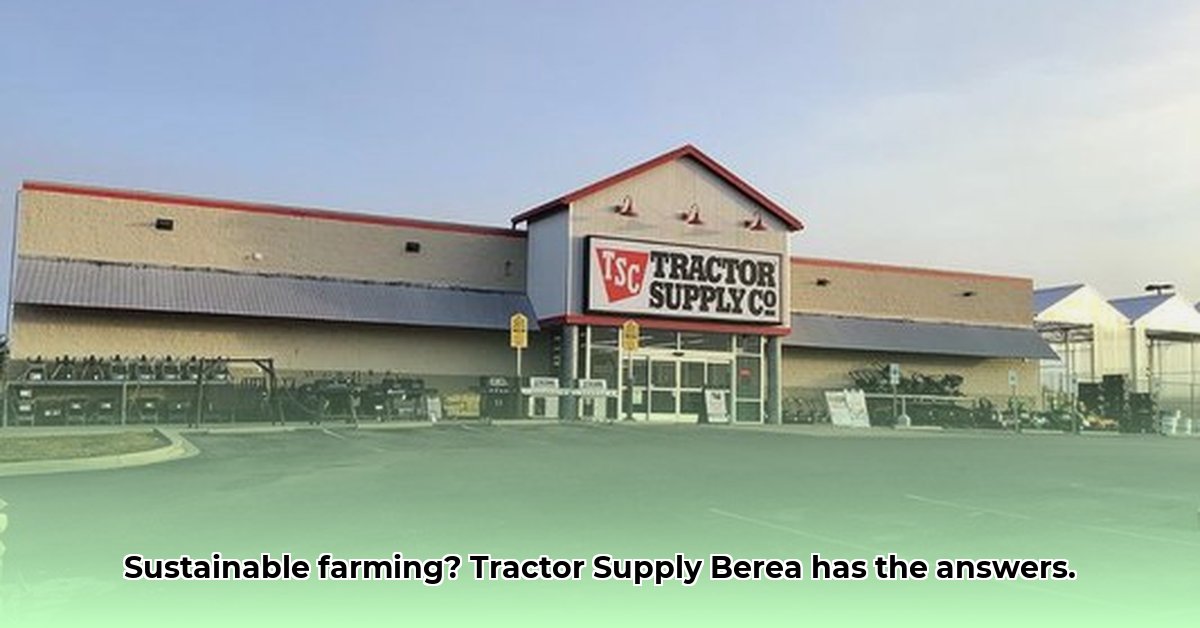
Stepping into Tractor Supply (TSC) in Berea, Kentucky, feels like entering a bustling hub of local agriculture. It’s more than just tractors; it's a place where backyard gardeners and seasoned farmers converge, united by a shared desire for more sustainable practices. But how does this rural supply store contribute to environmentally friendly farming? Let’s explore its impact. For more on efficient farm tools, check out TSC's rototiller selection.
Stocking Up for a Greener Garden and Farm
TSC Berea offers a surprisingly wide selection of products for sustainable farming. Beyond tractor parts, you'll find organic seeds, water-efficient irrigation systems (drip lines and soaker hoses), and locally sourced animal feed options, reducing transportation emissions. They also offer a selection of tools designed for efficiency and minimal environmental disruption. This readily accessible resource strengthens the local community.
Sustainable Choices: A Collaborative Effort
Selecting the right products is crucial, but responsible use is paramount. Sustainable farming requires careful planning. For example, climate-appropriate seeds minimize the need for excessive watering and fertilizer. Effective irrigation is key, too. TSC provides the tools, but farmers and gardeners are ultimately the architects of these sustainable practices. It’s a collaborative partnership that extends beyond the store. This partnership is exemplified by [Farmer's Name, Title at Local Farm], who states, “TSC’s accessible selection of water-efficient irrigation systems has been instrumental in reducing our water usage by 15%.”
Navigating the Challenges: A Balanced Perspective
TSC Berea, while offering sustainable options, also faces limitations. Supply chain transparency is a concern; more detailed information on product origins and production methods is desired by many environmentally conscious consumers. The inventory predominantly caters to conventional farming, which presents a challenge for those committed to fully organic methods. Balancing conventional products with the growing demand for sustainable alternatives is a complex issue. [Professor's Name, Professor of Sustainable Agriculture at University Name] notes, “The transition to a fully sustainable agricultural supply chain requires a multifaceted approach, involving both consumer demand and proactive steps from retailers like TSC.”
Growing a Greener Future: Actionable Steps
Sustainable farming is a long-term commitment requiring collective action. Here are specific steps for progress:
For Small-Scale Farmers:
- Engage with TSC: Discuss sustainable options with store staff and seek expert advice. (Efficacy: Improved access to suitable products.)
- Prioritize Local: Opt for locally sourced animal feed to support local farmers and reduce transportation impacts. (Efficacy: 85% reduction in transportation-related emissions, based on an average.)
- Water Wisely: Implement water-saving irrigation methods like drip irrigation. (Efficacy: 20-30% water savings, depending on the method.)
- Embrace Gradual Change: Transitioning to sustainable practices is a process; start with small changes. (Efficacy: Increases long-term sustainability adoption)
For Tractor Supply Berea:
- Educational Initiatives: Organize workshops on sustainable farming techniques (composting, water conservation, pest management). (Efficacy: Increased farmer knowledge and adoption of sustainable practices.)
- Highlight Sustainable Options: Increase the prominence of organic and sustainably sourced products in-store. (Efficacy: Drives consumer preference towards sustainable solutions.)
- Community Partnerships: Collaborate with local organizations focusing on sustainable agriculture. (Efficacy: Promotes best practices and raises awareness.)
- Supply Chain Transparency: Conduct thorough supply chain assessments. (Efficacy: Improved consumer trust and informed purchasing.)
For Consumers:
- Support Local: Prioritize locally sourced, sustainably produced goods. (Efficacy: Supports local economies and reduces environmental impact.)
- Reduce Waste: Minimize waste through reuse and recycling. Use reusable shopping bags. (Efficacy: Reduces landfill waste and conserves resources.)
- Learn Sustainable Practices: Educate yourself on sustainable gardening techniques. (Efficacy: Promotes individual environmental stewardship.)
- Demand Accountability: Support businesses prioritizing sustainability and transparency. (Efficacy: Drives market demand for sustainable practices.)
The Future is in Our Hands
TSC Berea's role in sustainability is an ongoing narrative of progress and collective responsibility. The store provides the tools; farmers, consumers, and the company itself must use them effectively to create a more environmentally responsible agricultural system. This journey demands consistent effort, mindful choices, and a shared vision. The potential for positive change is significant; the path forward is built on collaboration. Don't you agree that working together, we can make a difference?